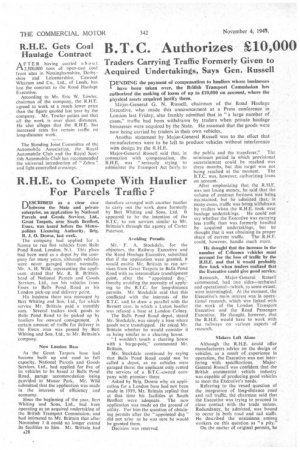R. H.E. to Compete With Haulier
Page 30

If you've noticed an error in this article please click here to report it so we can fix it.
For Parcels Traffic ?.
Dig,SCRIBEti as a clear case between the State and private enterprise, an appLeation by National Parcels and Goods Services, Ltd., Great Tarpots, near, South Benfleet, Essex, was heard before the Metropolitan Licensing Authority, Brig. R. J. 0. Howse, last week.
The company had applied for a licence to run five vehicles from Balls Pond Road, London, N.1. This place had been used as a depot by the company for many years, although vehicles were never garaged there. normally. Mr. A. H. Wild, representing the applicant. stated that Mr. R. B. Brittain, head of National Parcels and Goods Services, Ltd., ran his vehicles from Essex to Balls Pond . Road as his London pick-up and delivery point.
His business there was managed by Bert Whiting and Son, Ltd., for which service Mr. Brittain paid a monthly sum. Several traders took goods to Balls Pond Road to be picked up by hauliers for onward consignment. A certain amount of traffic for delivery in the Essex area was passed by Bert Whiting and Son, Ltd., to Mr. Brittain's company, New London Base As the Great Tarpots base had become built up and used to full capacity, National Parcels and Goods Services, Ltd., had applied for five of its vehicles to be based at Balls Pond Road. garage accommodation being provided at Manor Park. Mr. Wild submitted that the application was made in the interests of efficiency and economy.
Since the beginning of the year, Bert Whiting and Sons, Ltd., had been operating as an acquired undertaking of the British Transport Commission, and had intimated to Mr. Brittain that after November 1 it could no longer extend its facilities to him. Mr. Brittain had
A28 therefore arranged with another haulier to carry out the work done formerly by Bert Whiting and Sons. Ltd. It appeared to be the intention of the B.T.C. to run services similar to Mr. Brittain's through the agency of Carter Paterson.
Avoiding Permits
Mr. • F. A. Stockdale, for the objectors, the Railway Executive and the Road Haulage Executive, submitted that if the application were granted, it would enable Mr. Brittain to run services from Great Tarpots to Balls Pond Road with an intermediate transhipment point, after the "appointed day," thereby avoiding the necessity of applying to the B.T.C. for long-distance permits. Mr. Stockdale said that this conflicted with the interests of the B.T.C. and he drew. a parallel with the Barnett case, in which a Luton haulier was refused a base at London Colney.
The Balls Pond Road depot, stated Mr. Stockdale, was simply a base where goods we:e transhipped. He asked Mr. Brittain whether he would consider it as being similar to a clearing house.
"I wouldn't touch a clearing house with a barge-pole," commented Mr. Brittain.
Mr, Stockdale continued by saying that Balls Pond Road could not he called a depot, as no vehicles Were garaged there; the applicant only rented the services of a B.T.C,-owned company with premise: there
• Asked by Brig. Dowse why an application for a London base bad not been made in 1939, Mr. Brittain replied that at that time his facilities at South Benfleet were adequate. The new application was made on the ground of utility. For him the question of obtaining permits after the "appointed day" did not arise as he was sure he would be granted them.
Decision was reserved.




















































































